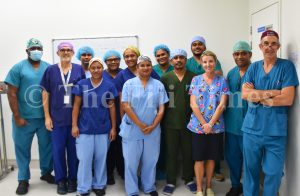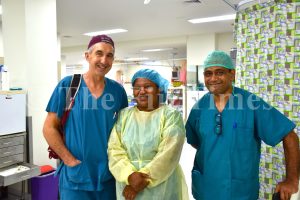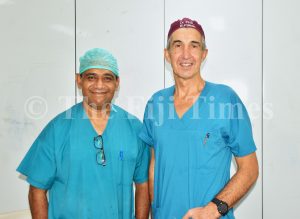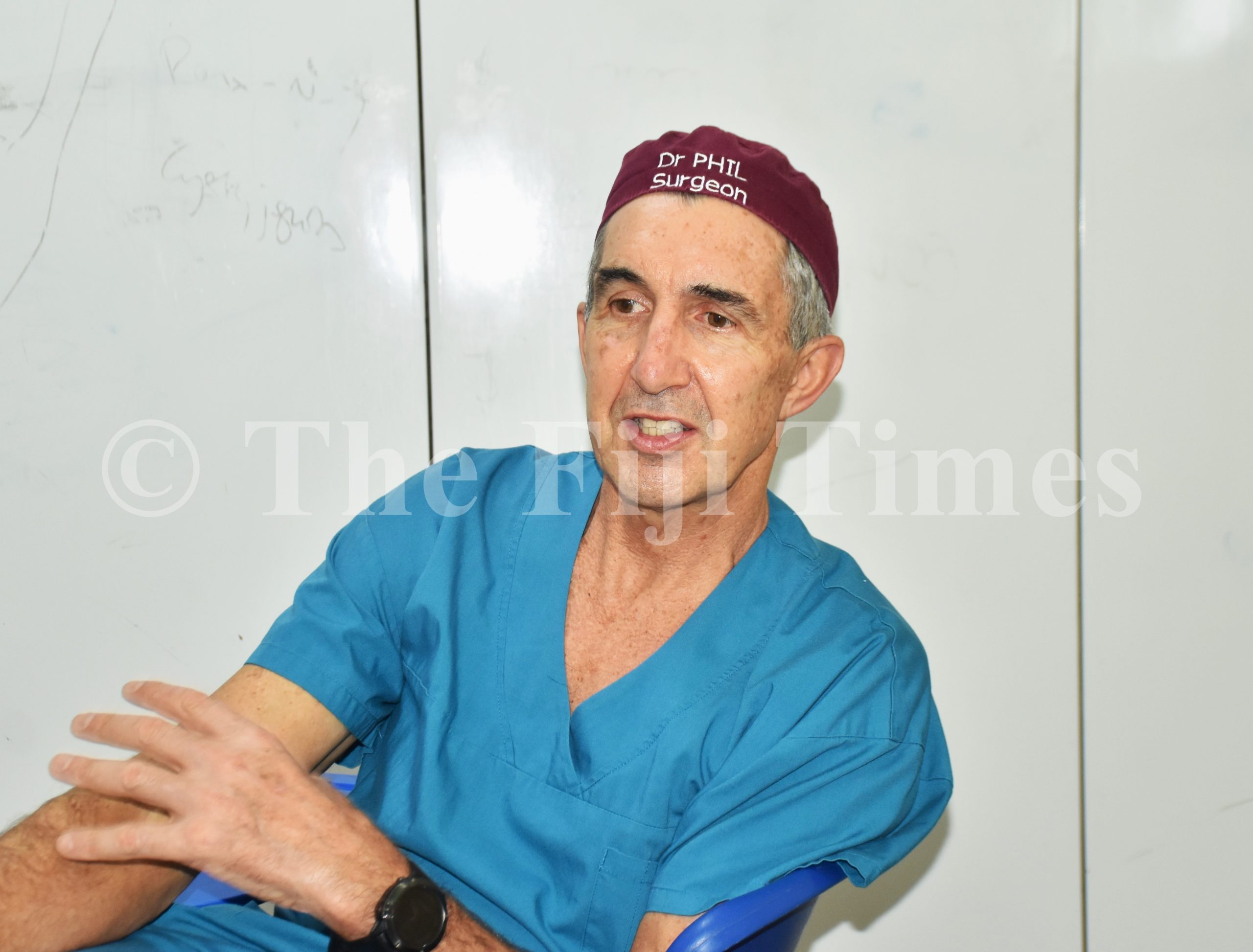Wherever the art of medicine is loved, there is also a love of humanity.
This is the code for medical professionals and one of those who takes this to heart is Doctor Philip Morreau.
His journey as a paediatric surgeon is a tale spliced with dedication, inspiration, and a touch of wanderlust.
Background
Born and bred in New Zealand, Dr Morreau has devoted his life to the delicate art of healing children. His path to medicine was shaped by a mixture of familial influence and a genuine passion for the sciences.
“I am a proud Kiwi, I’ve always been a surgeon for children. I did my adult training first in New Zealand and then went overseas for fellowships and I’ve been back in New Zealand since 1999,” Dr Morreau said.
His early years were spent in the South Island city of Christchurch.
However, his childhood was far from static. The family frequently moved, guided by the calling of his father, a devoted church minister. This nomadic lifestyle included a significant stint in the Netherlands, the homeland of his father, before returning to the familiar landscapes of New Zealand.
“I had an older brother, who became a paediatrician, and he is 10 years older than me.
“My father was always busy ministering, so my brother was a mentor and role model for me and when he went down the medical way.”
Watching his brother navigate the medical field instilled in Dr Morreau a clear sense of direction. It wasn’t long before he too felt the pull towards medicine.
Though veterinary science also piqued his interest, the allure of becoming a paediatric surgeon ultimately prevailed.
He pursued his initial training in New Zealand, demonstrating unwavering commitment and skill, which paved the way for advanced fellowships overseas.
Since 1999, Dr Morreau has been back on home soil, channelling his expertise into the care of countless young patients.

Career
Reflecting on his career, Dr Morreau speaks with humility and gratitude.
“It is an incredibly privileged opportunity.
“It is a wonderful thing doctors must do, to deal with a lot of uncertainty.
“It’s also really important that you talk to both the team you work with and also the family, because sometimes just following procedure isn’t always the best way forward.”
He embraces the inherent uncertainties of the medical field, seeing them as challenges that require both intellectual and emotional acumen – and that understanding the patient holistically often trumps simply following procedural protocols. This empathetic approach ensured that each child received the best possible care tailored to their unique needs.
“My first time operating was as a medical student. I was assisting senior surgeons while they were operating, and I remember learning a lot.
“I would watch meticulously how everything a surgeon does is action related; it was very tangible what you did.”
It was in the operating theatre that he first donned surgical gloves and assisted senior surgeons.
Unlike prescribing medications and waiting to observe the effects, surgery offered an immediate hands-on approach to problem-solving. The tangible nature of the work —opening up a patient to identify and address the issue directly resonated deeply with him.
“It was an overcoming kind of feeling. It became all personal for me and I remember just standing there and telling myself, I’m right where I need to be.”
By the early 1990s, Dr Morreau had completed his qualifications, fully embracing the world of paediatric surgery. His practice spans the full spectrum of paediatric surgery and urology, yet he harbours special interests that set his work apart. Thoracic surgery in children, oncologic surgery, and the complex management of children with vascular anomalies and hepatobiliary conditions are areas where he has honed his expertise.
Challenges
Each case presents unique challenges, and Dr Morreau approaches them with the same meticulous care and tangible problem-solving skills that captivated him during his early days in the operating room.
“Well of course no one, especially in the medical field, gets to where I am without bruising themselves and going through so much hardships, you’d want to quit,” he says.
Dr Philip Morreau reflected on his journey with a deep sense of both accomplishment and humility. The greatest challenge he faced was the extensive and intense medical training required to reach his current position.
The rigorous demands of earning his qualifications, passing speciality exams, and establishing his own practice were daunting tasks that tested him in every way.
“Once I got my ticket to get all your speciality exam and stuff and then you have to get your own practice and do something and then reflect on what happened and seek to improve what happened.
“As a young individual at that time, it was rather challenging. I struggled in that period of my journey.”

Overcoming challenges
Despite these early challenges, Dr Morreau’s perspective evolved as he progressed in his career. He came to understand that surgery, by its very nature, demands a relentless commitment to quality and continual improvement.
“I realised that surgery is pretty much like that (adopt and improve your own practices), you have to continue that quality side of things.”
This realization, though initially difficult to accept, became a cornerstone of his professional philosophy.
“One of the most profound lessons I learned was the sobering reality that not every patient can be cured.”
Accepting this truth was particularly hard, yet it underscored the importance of providing unwavering care to every patient. Over time, he developed a sense of acceptance and focused on doing the best he could for each child, which he recognised as the essence of being a doctor.
“Anyone in my profession understands that you will be touched in different ways you’ve never been touched before.
“Over time, I grew a sense of acceptance and did the best I could, which is the best anyone could and that is what being a doctor is about.”
In his practice, Dr Morreau often finds himself forming bonds with the children he treats, especially those he couldn’t save. These connections are deeply personal, sometimes sparked by a shared birthday, a familiar hair colour, or a relatable background. Despite these emotional ties, he understands the necessity of maintaining objectivity in his work.
The human contact and the trust placed in him by families created a sense of familial bond, a reminder of the immense responsibility he carries
First visit to Fiji
Aside from his medical experience in his early years, Dr Morreau visited Fiji in 2007, which was an eye-opening experience.
He describes himself as feeling like “a possum in the headlights,” overwhelmed by the stark differences between Fiji and his home in New Zealand.
“It’s different here in Fiji and there are a lot of things we take for granted and make a lot of assumptions. I learnt over time to be sensitive to the cultural needs and culture of the community.
“It took a long time for my sense in what’s important and how the Fijian society functions.”
This cultural immersion enriched his perspective, allowing him to provide better care tailored to the local context and since 2013, Dr Morreau has made regular trips to Fiji, bringing with him a team of specialists from New Zealand.
These visits display commitment on his part to extending quality paediatric care beyond his own country and his work driven by a profound belief in people and humanity.

Motivation
When asked about what gets him out of bed and in the surgical theatre, he says “there is no real motivation”.
“I would say I’m a humanist,” he says, “I’m also quite reflective, so I’m always looking back on how to improve myself and those around me.”
He simply believes in goodwill and service to humanity.
The relationships he has built over the years hold a special place in his heart, providing a deep sense of satisfaction and purpose.
Despite the long hours and hard work, Dr Morreau finds joy in the camaraderie and community that forms among his team of nurses and doctors.
Their shared sense of friendship, goodwill, and dedication to getting the job done reinforces his commitment to his work.
“I take great pride in seeing the progress and skill development of my colleagues, anyone would be filled with the an overwhelming satisfaction watching the people we watch struggle to get where they are, succeed.”
Goals
One of Dr Morreau’s key goals is to build local capacity. He believes the more they can achieve within the country, the better it is for everyone.
“Over my many years, I’ve mentored and trained many young and passionate specialists and surgeons and my focus is especially here in the Pacific.
“There is always room for improvement and the resources will always be tight.”
“However, despite that fact, I can proudly say we now have people who can not only serve the Fijian people but also the wider community of the Pacific.
“I took a photo of the first training I conducted, where the trainees are now obstetricians, surgeons, politicians, ministers of health and now one of them has become the regional officer for the Western Pacific for WHO.”
“We’ve come a long way and I think we are building a critical mass of confident people.”
Advice
Reflecting on his extensive career, Dr Morreau offers heartfelt advice to aspiring doctors.
“You have to be committed to the cause.” He describes the medical profession as an incredible opportunity where the impact one can make is both a blessing and immensely rewarding.
He believes that playing a significant role in people’s lives brings a profound sense of fulfilment. This intrinsic reward is what makes the hard work worthwhile. “So, keep up the hard work.”
Future
Looking ahead, he is already planning the next trip to Fiji. Collaborating with doctors from various parts of the Pacific, they discussed the best ways to manage medical challenges in the region.
“Probably this time next year, we will be coming again.”
On Saturday, May 18, 2024, Dr Morreau and his team visited Fiji as part of their yearly visitations and conducted 13 operations over the period of four days.
He has another calling in another part of the world — Melbourne in Australia.
“I’m going to Melbourne to examine the latest batch of young specialist surgeons from New Zealand and Australia but my colleagues will stay a bit longer, to help with the work already done.”
Dr Morreau has changed so many lives here in Fiji and his healing hands have extended into the Pacific, not only caring for patients but inspiring others to follow in his footsteps.
“It’s not about me, it’s more about the people I work with,” he shared “Together we make a difference.”



